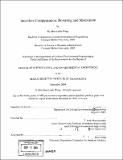| dc.contributor.advisor | Fred Moavenzadeh. | en_US |
| dc.contributor.author | Wang, Shun Linda, 1980- | en_US |
| dc.contributor.other | Massachusetts Institute of Technology. Dept. of Civil and Environmental Engineering. | en_US |
| dc.date.accessioned | 2005-09-27T17:25:54Z | |
| dc.date.available | 2005-09-27T17:25:54Z | |
| dc.date.copyright | 2004 | en_US |
| dc.date.issued | 2004 | en_US |
| dc.identifier.uri | http://hdl.handle.net/1721.1/28634 | |
| dc.description | Thesis (S.M.)--Massachusetts Institute of Technology, Dept. of Civil and Environmental Engineering, 2004. | en_US |
| dc.description | Includes bibliographical references (leaves 79-81). | en_US |
| dc.description.abstract | Management is often frustrated by the lack of motivation generated by end of the year bonuses. Currently, there are two compensation ideals, merit-based versus incentive-based. Merit based compensation correlates compensation to one's job performance, whereas incentive based on set goals and correlates bonus rewards before the time frame used to evaluate the performance. An effective incentive program contributes to a company's overall competitiveness by encouraging superior performance as well as improving the company's earning and cash flow. An incentive compensation program is not a substitute for lack of staff accountability, rather it should be used to motivate individuals and align the goals of individuals with those of the company. The purpose of this study is three-fold. First to determine current incentive package in A/E/C firms and comparing them with other industries' compensation. Second, research how more fitting incentive packages will help to make the industry more efficient, and transform the industry to a non-zero sum situation for all parties. Lastly, determine factors needed to have a complete incentive package, as well as explore possible ways of implementation of the incentive programs. In conclusion, not all A/E/C firms will benefit from incentive programs, but those that are in certain fields of the industry will see an increase in productivity and overall competitiveness of the firm. | en_US |
| dc.description.statementofresponsibility | by Shun Linda Wang. | en_US |
| dc.format.extent | 89 leaves | en_US |
| dc.format.extent | 2392429 bytes | |
| dc.format.extent | 2402540 bytes | |
| dc.format.mimetype | application/pdf | |
| dc.format.mimetype | application/pdf | |
| dc.language.iso | en_US | |
| dc.publisher | Massachusetts Institute of Technology | en_US |
| dc.rights | M.I.T. theses are protected by copyright. They may be viewed from this source for any purpose, but reproduction or distribution in any format is prohibited without written permission. See provided URL for inquiries about permission. | en_US |
| dc.rights.uri | http://dspace.mit.edu/handle/1721.1/7582 | |
| dc.subject | Civil and Environmental Engineering. | en_US |
| dc.title | Incentive compensation : bonusing and motivation | en_US |
| dc.type | Thesis | en_US |
| dc.description.degree | S.M. | en_US |
| dc.contributor.department | Massachusetts Institute of Technology. Department of Civil and Environmental Engineering | |
| dc.identifier.oclc | 58918023 | en_US |
